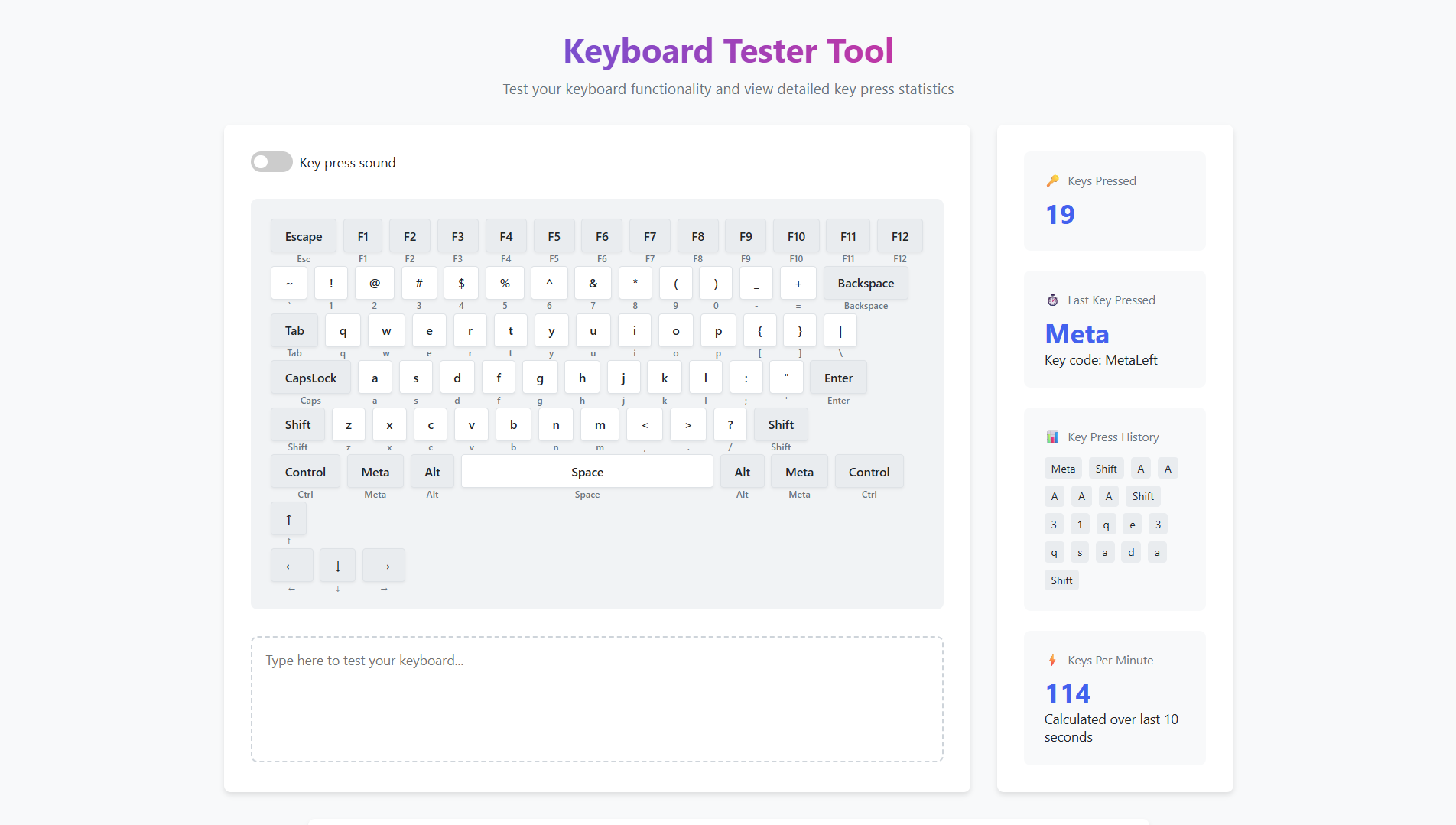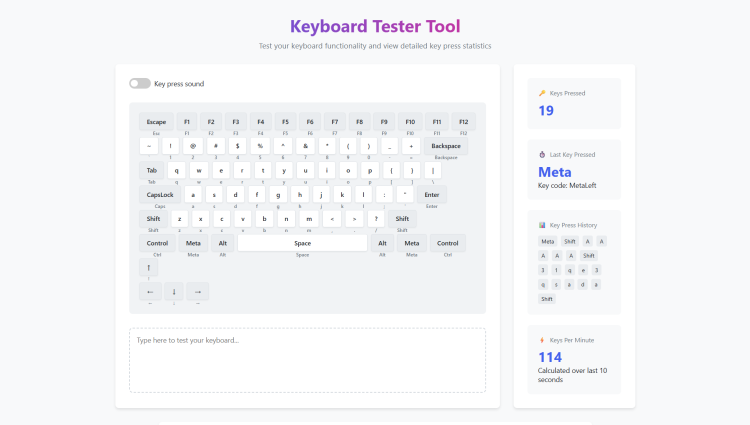Keyboard Tester Tool Using HTML, CSS and JavaScript with Source Code
Welcome to the Keyboard Tester Tool – your go-to web application for testing and troubleshooting keyboard functionality with ease! This interactive tool provides real-time visual feedback as you type, highlighting pressed keys on a virtual keyboard while tracking essential metrics like typing speed, key press history, and responsiveness. Whether you're diagnosing a sticky key, checking your typing performance, or simply ensuring all keys work correctly, this tool offers a clean, modern interface that works seamlessly across all devices.
Designed with simplicity and effectiveness in mind, the Keyboard Tester Tool is built entirely with HTML, CSS, and JavaScript – no installations or plugins required! Just open it in your browser and start typing to see instant results. With features like key press sounds (toggleable), detailed statistics, and mobile-friendly support, this tool is perfect for both casual users and professionals who need a reliable way to test their keyboards. Give it a try and experience a smarter way to check your keyboard's health!
You may also check this simple HTML, CSS and JavaScript project:
- System Info Viewer
- Workout Timer App
- Advanced Grade Calculator
- Income and Expense Tracker
- Flashcard Maker
Key Features:
✅ Interactive Virtual Keyboard
Visual representation of a standard keyboard layout.
Keys light up when pressed for instant feedback.
Supports modifier keys (Shift, Ctrl, Alt, etc.) and special keys (F1–F12, Arrow keys).
✅ Real-Time Statistics
Keys Pressed Counter: Tracks total key presses.
Last Key Pressed: Displays the most recent key and its key code.
Key Press History: Shows the last 20 keys pressed.
Keys Per Minute (KPM): Measures typing speed over the last 10 seconds.
✅ Sound Feedback
Optional key press sound effects (toggle on/off).
✅ Mobile & Desktop Friendly
Works with both physical keyboards and on-screen mobile keyboards.
Responsive design adapts to different screen sizes.
✅ Clean & Modern UI
Sleek, intuitive interface with smooth animations.
Dark/light mode compatible (based on system preferences).
Technologies Used:
HTML5 – Structure and semantic markup.
CSS3 – Styling, animations, and responsive design.
JavaScript (Vanilla JS) – Keyboard event handling, dynamic updates, and statistics calculation.
Web Audio API – For key press sound effects.
How to Use:
1. Open the Application
Simply load the HTML file in any modern web browser (Chrome, Firefox, Edge, Safari).
2. Test Your Keyboard
Start typing in the test area or press any key on your physical keyboard.
The virtual keyboard will highlight pressed keys in real-time.
3. View Statistics
Monitor your key presses, last key pressed, and typing speed (KPM) in the stats panel.
Check the key history to review recent inputs.
4. Toggle Sound Effects (Optional)
Enable/disable key press sounds using the toggle switch.
5. Mobile Users
Tap the test area to open the on-screen keyboard and test touchscreen typing.
Sample Screenshots of the Project
Landing Page

How to Run?
- Download the provided source code zip file.
- Extract the downloaded zip file.
- Open the html file and you are now ready to go!
Video Demonstration for Installation/Setup:
Conclusion:
In conclusion, the Keyboard Tester Tool provides a simple yet powerful way to check your keyboard's functionality while offering valuable insights into your typing performance.
With its intuitive interface, real-time visual feedback, and comprehensive statistics, this web app makes it effortless to diagnose key issues, track typing speed, and ensure your keyboard is working perfectly – all without needing to install any software. Whether you're a casual user, gamer, or IT professional, this tool delivers an efficient keyboard testing solution right in your browser!
Note: Due to the size or complexity of this submission, the author has submitted it as a .zip file to shorten your download time. After downloading it, you will need a program like Winzip to decompress it.
Virus note: All files are scanned once-a-day by SourceCodester.com for viruses, but new viruses come out every day, so no prevention program can catch 100% of them.
FOR YOUR OWN SAFETY, PLEASE:
1. Re-scan downloaded files using your personal virus checker before using it.
2. NEVER, EVER run compiled files (.exe's, .ocx's, .dll's etc.)--only run source code.

